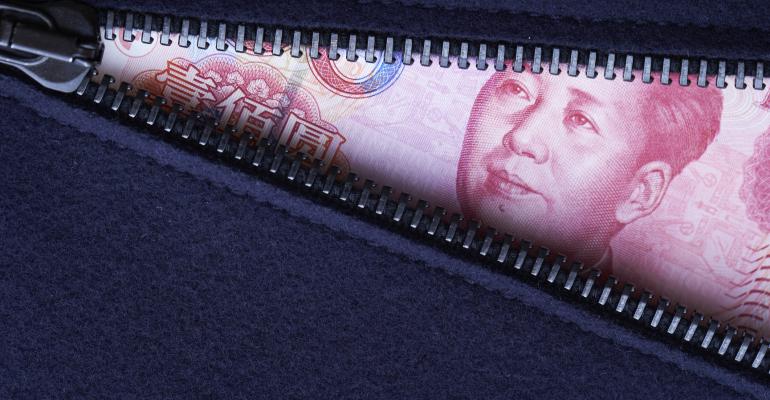(Bloomberg)—China’s escalating crackdown on capital outflows is sending shudders through property markets around the world.
In London, Chinese citizens who clamored to purchase flats at the city’s tallest apartment tower three months ago are now struggling to transfer their down payments. In Silicon Valley, Keller Williams Realty says inquiries from China have slumped since the start of the year. And in Sydney, developers are facing “big problems” as Chinese buyers pull back, according to consultancy firm Basis Point.
“Everything changed’’ as it became more difficult to send money offshore, said Coco Tan, a broker at Keller Williams in Cupertino, California.
Less than a month after China announced fresh curbs on overseas payments, anecdotal reports from realtors, homeowners and developers suggest the restrictions are already weighing on the world’s biggest real estate buying spree. While no one expects Chinese demand to disappear anytime soon, the clampdown is deterring first-time buyers who lack offshore assets and the expertise to skirt tighter capital controls.
“If it’s too difficult, I’m out,’’ said Mr. Zheng, 66, a retired civil servant in Shanghai who declined to give his first name to avoid attracting regulatory scrutiny. He may abandon a 2.4 million yuan ($348,903) home purchase in western Melbourne, even after shelling out a 300,000 yuan deposit last August. He’s due to make another big payment next month.
The change spooking Zheng and his compatriots came in a statement from the State Administration of Foreign Exchange on Dec. 31, hours before the reset of Chinese citizens’ annual foreign currency quotas. Among other requirements, SAFE said all buyers of foreign exchange must now sign a pledge that they won’t use their $50,000 quotas for offshore property investment. Violators will be added to a government watch list, denied access to foreign currency for three years and subjected to money-laundering investigations, SAFE said.
“A lot of clients are worried and have started hesitating,’’ said Wang Ning, vice president of the international department at Fang Holdings Ltd., China’s most popular property website. While the regulator has long banned the use of foreign currency for real estate, its call for additional documentation was seen as a signal that the government is serious about cracking down.
At The Spire in London, a 67-story tower with sweeping views of the River Thames and flats starting at 595,000 pounds ($751,901), prospective buyers were caught off guard by the new rules. Less than 70 percent of clients who signed purchase contracts last year have made their initial payments, with the rest now facing “problems,’’ a press official at Greenland Holdings Corp., the project’s Shanghai-based developer, said on Jan. 12. The official asked not to be named, citing company policy.
While Beijing’s policy tweak may appear symbolic on the surface, it’s likely to cause a “notable reduction” in Chinese purchases of Australian property, according to Christopher Todd ‘CT’ Johnson at Basis Point, a consulting firm that specializes in business relations between the two nations. Australia approved A$24 billion ($18.1 billion) of real estate investments from China in the fiscal year ended June 2015, the most recent figures available, making the country by far the biggest source of foreign buyers.
Even with tightened capital controls, brokers say motivated Chinese investors can usually find ways around them. In any case, many already have money parked offshore, according to Michael Finger, the head of Ray White Double Bay, a real estate agency in Sydney’s eastern suburbs. Just before Christmas, he sold a multi-million dollar home to Chinese citizens who had moved money to Australia before the clampdown. Finger says he’s seeing more e-mail inquiries from buyers eager to buy offshore assets before authorities clamp down any further.
A more complete picture of Chinese demand may only emerge after the Lunar New Year holiday, when wealthier buyers often combine overseas property hunting with sightseeing. Agents surveyed by Chinese property portal Juwai.com say they’re expecting a busier holiday season than in 2016.
Still, broad measures of China’s capital flight suggest government curbs were having an effect even before SAFE’s Dec. 31 rule changes. For the first time since the yuan’s devaluation in August 2015, Chinese banks last month registered net inflows under the capital account, the currency regulator said on Jan. 19. Offshore payments in yuan have also moderated, while the currency has strengthened 1.2 percent against the dollar since touching an eight-year low on Dec. 28.
“There will certainly be an impact,’’ Eric Lam, chief executive at the overseas broker unit of Shenzhen World Union Properties Consultancy Inc., China’s largest realtor for new-home sales, said by phone from Hong Kong.
For Zheng, the decision on whether to walk away from his Melbourne property or risk breaking China’s foreign-exchange rules is fast approaching. He’s scheduled to wire another 800,000 yuan to Australia in late February to cover the rest of his down payment.
“I can probably meet future mortgage payments with rental income from the villa, but a more imminent problem is whether to wire money abroad now,” Zheng said. “I’m not too sure about that. It’s safer not to stick my neck out."
To contact Bloomberg News staff for this story: Zhang Dingmin in Beijing at [email protected]; Emma Dong in Shanghai at [email protected]; Sharon Smyth in London at [email protected]; Prashant Gopal in Boston at [email protected]; Emily Cadman in Sydney at [email protected]. To contact the editors responsible for this story: Sree Vidya Bhaktavatsalam at [email protected] ;Neil Callanan at [email protected] Michael Patterson
COPYRIGHT
© 2017 Bloomberg L.P

